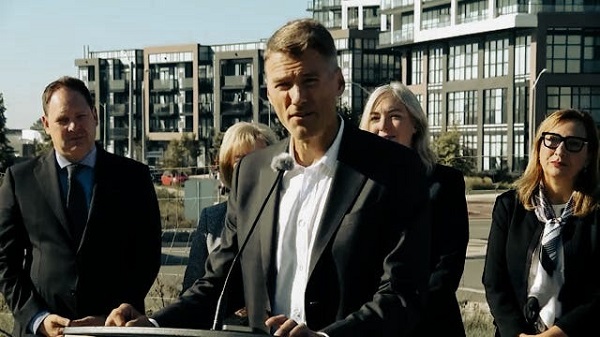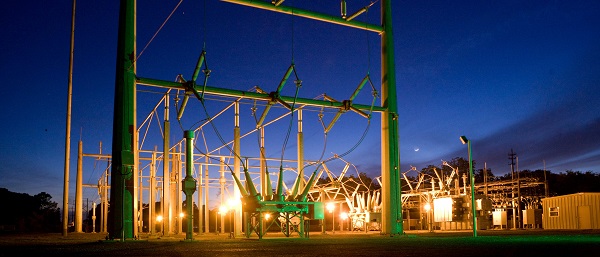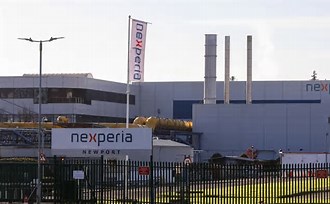Business
“Nation Building,” Liberal Style: We’re Fixing a Sewer, You’re Welcome, Canada

Ottawa held a full-blown press conference to announce they unclogged a pipe in Toronto and called it a generational housing strategy.
You probably didn’t hear much about it unless you were watching Canadian state media but this morning, the Liberal government held a press conference in Toronto. It was billed as a “generational investment” in housing. That’s the phrase they used. In reality, it was a sewer project.
Gregor Robertson, the former mayor of Vancouver and now the federal minister of housing and infrastructure, stood beside Toronto Mayor Olivia Chow and a cluster of Liberal MPs to announce that Ottawa is spending $283 million to upgrade the Black Creek trunk sewer line. That’s a pipe. A very old pipe. And according to Robertson, that investment will “unlock” the construction of up to 63,000 new homes in the Downsview area.
If that sounds suspiciously like taking credit for doing your job, maintaining the basic infrastructure cities rely on, that’s because it is. No one has ever accused the Liberals of missing an opportunity to repackage civic maintenance as a national moral crusade. The sewer line is 65 years old. It overflows during storms. It’s been a known problem for decades. Fixing it is not bold housing policy. It’s plumbing.
But the political optics are irresistible. The Trudeau Liberals, now under the leadership of Mark Carney are desperate for a win on housing. Their record is catastrophic. Home prices have doubled. Rents have soared. Entire generations of Canadians have been priced out of ownership and locked into permanent renter status. And the architects of that disaster are now flying around the country handing out ribbon-cutting ceremonies and calling it reform.
Today’s announcement also included the unveiling of the first project under a brand-new federal housing agency, Build Canada Homes. Never heard of it? That’s because it didn’t exist until a few weeks ago. And who’s running it? None other than Ana Bailão a Liberal operative and former Toronto city councillor who spent years helping make the city unaffordable in the first place. Now she’s being rewarded with a cushy federal appointment, tasked with building modular housing and handing out contracts on public land.
And what exactly is Build Canada Homes building? Today, they’re launching 540 homes. Not 63,000… 540. Factory-built units that will be delivered at some undefined point in the future. That’s the big federal breakthrough. A housing crisis affecting millions of Canadians, and Ottawa’s answer is five hundred and forty modular homes in Downsview.
This is the pattern every time. The government breaks something, calls it a crisis, and then demands credit for fixing a fraction of it with your money. The numbers are staggering. According to the Parliamentary Budget Office, Canada needs 3.1 million more homes by 2030 to restore affordability. That means building over 430,000 units per year. Right now, we’re building maybe half that. The backlog gets worse every year. But today, we’re supposed to celebrate because they’re unclogging a sewer and firing up a couple prefab builds on federal land.
No one in the press asked the obvious question: why aren’t private builders constructing the 300,000 units that Toronto has already zoned and approved? Because they can’t. The financing doesn’t work. The cost of materials is too high. Interest rates have crippled developers. And cities like Toronto still impose hundreds of millions of dollars in fees, development charges, and bureaucratic red tape. That’s the real bottleneck. Not the sewer. And here’s what they definitely won’t say out loud: Canada’s housing disaster is not just about supply. It’s about demand, turbocharged by one of the fastest immigration intakes in the Western world. The Bank of Canada has warned repeatedly that immigration targets, set without any link to housing capacity — have blown demand wide open and put relentless upward pressure on rents and home prices.
Mayor Chow admitted it herself, sort of. She said the city has thousands of units ready to build but no takers. And instead of confronting the root causes, monetary policy, taxes, regulatory insanity, the government announces a pilot project and tells you to be grateful. That’s how disconnected they are from reality. They’ve regulated housing out of reach and now they’re posing for photos on a construction site, pretending to be the solution.
And just in case there was any lingering doubt about how deep this failure runs, Statistics Canada released its latest building permit numbers this morning and the trend is exactly what you’d expect in a country where the government makes building homes all but impossible.
The total value of building permits dropped again in August down $139 million to $11.6 billion. Residential permits alone fell 2.4%, driven by steep declines in Ontario and Alberta, the very provinces with the most acute housing needs. Single-family permits fell off a cliff — down more than 10% year-over-year. That’s not a slowdown. That’s a stall.
Meanwhile, British Columbia and Quebec where government intervention is particularly heavy barely managed to offset the damage. The number of new dwellings authorized actually shrank month over month. And this is happening in the middle of a so-called national housing push.
StatsCan didn’t sugarcoat it. They didn’t blame foreign investors or greedy landlords or some phantom market force. They just showed the raw data: Permits are falling. Housing starts are lagging. Builders are retreating.
So let’s just pause here and appreciate the sheer absurdity of what we witnessed. A parade of officials, flanked by branded podiums and tax-funded media handlers, standing in front of a construction site to announce, with straight faces, that they are upgrading a sewer line. And for this, we are told we are “building Canada strong.” Really? That’s the pitch? Fixing basic municipal plumbing is now a nation-building moment?
No! Let’s be clear, you’re not building Canada strong. You’re doing your job. A sewer upgrade in Toronto is not some heroic act of visionary leadership. It’s literally maintenance. It’s what functioning governments are supposed to do, quietly, competently, without a six-camera press choreography and a round of applause from party MPs.
But in Liberal Carney Canada the bar has been lowered so dramatically that simply clearing a permit backlog and patching old infrastructure is treated like a moon landing. They break the system, congratulate themselves for patching one pipe, and expect gratitude.
If you want praise for fixing aging civic infrastructure, something cities used to handle without a national press event, then that tells us everything. It tells us the Liberal government has become so hollow, so addicted to performance politics, that maintenance is now treated as achievement. That’s how far we’ve fallen in just ten years.
They didn’t rebuild a nation. They didn’t launch a housing renaissance. They unclogged a sewer, and are now demanded a standing ovation. And that, in a single image, is modern Liberal Canada: the total collapse of standards, repackaged as progress and sold back to you at full price.
Canadians don’t need more press conferences. They need homes, dignity, and a government that works without constant applause. And if unclogging a pipe is what passes for leadership now — then God help the country.
Subscribe to The Opposition with Dan Knight .
For the full experience, upgrade your subscription.
Business
Finance Committee Recommendation To Revoke Charitable Status For Religion Short Sighted And Destructive

From the Frontier Centre for Public Policy
A new report from the Frontier Centre for Public Policy warns that proposed changes to Canada’s Income Tax Act could have devastating consequences for churches and faith-based organizations nationwide.
Revoking the Charitable Status for the Advancement of Religion: A Critical Assessment, by senior fellow Pierre Gilbert, responds to the 2025 Standing Committee on Finance’s recommendation to remove “advancement of religion” as a recognized charitable purpose.
If adopted, the measure could strip churches, mosques, synagogues, temples and religious charities of their charitable status. The impact would include the loss of income tax exemptions and the inability to issue charitable tax receipts. They could also face a one-time penalty tax that effectively wipes out most of what they own.
“The committee’s recommendation, driven by lobbying from the BC Humanist Association, represents a direct threat to religious freedom and the vital role faith communities play in Canadian society,” said Gilbert. “Religious organizations contribute an estimated $16.5 billion annually to Canada through social services, education, community programs and cultural preservation. Revoking their charitable status would be both fiscally shortsighted and socially destructive.”
The report traces the origins of charitable status in English common law, examines the rise of secularism and fiscal pressures driving the proposed change, and calls on churches to proactively respond through education, advocacy and reasserting their public mission.
Download full PDF here. (30 pages)
Business
Finance Titans May Have Found Trojan Horse For ‘Climate Mandates’


From the Daily Caller News Foundation
By Audrey Streb
Major global asset managers including BlackRock and Blackstone have been looking to buy power utilities across America in a move that some industry insiders warn could harm consumers, raise electricity costs and advance a climate-driven energy agenda.
In recent months, Blackstone reportedly sought regulatory approval to buy utilities in New Mexico and Texas all while a BlackRock-led group won approval Friday to purchase a major utility in Minnesota. While BlackRock and other huge asset managers have distanced themselves from environmental, social and governance (ESG) investment practices in recent years, some energy experts and consumer advocates that spoke to the Daily Caller News Foundation are concerned that buying up utilities may represent a new frontier of financial giants orchestrating “climate mandates.”
“BlackRock isn’t just influencing utilities anymore, they’re buying them. After years of ESG-driven coercion that pushed utilities to abandon reliable energy in favor of China-dependent renewables, BlackRock is now taking direct control. The result will be more of the same: higher costs, weaker grids, and millions in unpaid bills, all driven by the very climate mandates they lobbied for,” Jason Isaac, CEO of the American Energy Institute, told the DCNF. “Minnesotans should brace for more unreliable power, rising rates, and a media narrative that blames Trump for ending taxpayer-funded handouts instead of holding the woke politicians and Wall Street elites responsible for the crisis.”
Electricity demand is on the rise after years of stagnancy as the artificial intelligence (AI) race ushers in the build out of power-hungry data centers. Utility costs are also spiking as demand takes off in a trend that dates back to the Biden administration.
Against this backdrop, private investment titans like BlackRock and Blackstone are reportedly moving to buy power utility companies and invest in data center expansions and startups.
Minnesota recently granted the BlackRock-led group known as Global Infrastructure Partners (GIP) approval to buy one of the state’s major power utilities, Allete. GIP is also reportedly on the cusp of acquiring the major energy company, AES, according to sources familiar with the matter that spoke with Reuters. The Financial Times reported that the deal may be for $38 billion.
BlackRock referred the DCNF to Allete’s statement on regulators approving its partnership with GIP and declined to comment further for this story.
Allete’s statement notes that the impending partnership with the BlackRock-led group includes “guaranteed access to capital to fund ALLETE’s five-year plan for advancing transmission and renewable energy goals [and a] $50 million Clean Firm Technology Fund to support regional clean-energy projects and partnerships.”
The Federal Energy Regulatory Commission (FERC) renewed BlackRock’s ability to own up to 20% of utility voting shares in April, with former FERC Commissioner Mark Christie stating that BlackRock “pledged not to use its holdings to influence utility management” and that utilities need the access to capital.
Christie also warned in September 2024 that “this is an issue that deserves much greater scrutiny” and that “the influence that large shareholders, BlackRock or otherwise, can potentially exert across the consumer-serving utility industry should not be underestimated.”
Blackstone has reportedly sought regulatory approval to buy out the Public Service Company of New Mexico and Texas New Mexico Power Co. recently, according to The Associated Press. The asset management giant also secured a 19.9% stake in a Northern Indiana public utility for over $2 billion in January 2024.
“Blackstone’s sustainability strategy prioritizes accelerating decarbonization by investing in the energy transition and driving value accretive emissions reduction in our portfolio,” Blackstone’s 2024 sustainability report states. “We believe the transition to cleaner energy creates meaningful investment opportunities for private capital. For over a decade, we have pursued attractive investments in companies and assets that are part of the global energy transition as part of our broader energy investing strategy.”
Blackstone also announced on Sept. 15 that private equity funds affiliated with Blackstone Energy Transition Partners will acquire the Pennsylvania-based Hill Top Energy Center natural gas plant for almost $1 billion. The company also announced in July that funds managed by Blackstone Infrastructure and Blackstone Real Estate would invest over $25 billion to help build out Pennsylvania’s energy infrastructure to support the AI “revolution.”
“Renewable” energy goals and ESG investment tend to align with emissions-reduction targets, with some power companies, utilities and states that set goals to cut emissions striving to retire conventional energy sources like coal plants. Isaac added that companies like American Electric Power, in which BlackRock owns a significant stake, have been decommissioning coal plants and replacing them with intermittent sources like solar.
“What happens is when the wind stops blowing and the sun stops shining, then you have to ramp those generational assets back up, and that’s when price spikes happen,” Isaac said.
University of North Carolina at Chapel Hill professor of finance Greg Brown told the AP that the reason behind these buyouts are “very simple. Because there’s a lot of money to be made.”
Other experts devoted to consumer protection like Executive Director of Consumers’ Research Will Hild told the DCNF that investment companies like BlackRock stand to gain more than just a profit from these purchases.
“There is no world in which BlackRock’s ownership of American energy benefits ordinary American consumers,” Hild told the DCNF. “This is the same firm that proudly brought us the radical ESG rules and Net-Zero nonsense that forced all our energy bills to skyrocket. We wouldn’t have the scourge of woke capitalism without Larry Fink, who already controls nearly $13 trillion in assets and has been sued for violating anti-trust laws.”
ESG investors weigh a company by its social and environmental choices as well as its finances in a move that critics say bogs down businesses with new costs while doing little to combat climate change. One August 2023 InfluenceMap report showed that as Republicans at the state level and in Congress ramped up their opposition to ESG-focused practices, BlackRock and other major U.S. asset managers decreased their support for climate-related resolutions.
BlackRock CEO Larry Fink also said in June 2023 that he no will no longer use the term ESG because it has been “politicized,” less than a year after he noted that climbing energy prices are “accelerating” the green energy transition.
“BlackRock has backpedaled on its ESG messaging and its aggressive, unapologetic imposition of ESG on everything they touch. But the leopard hasn’t changed its spots,” President of the Heartland Institute James Taylor told the DCNF. “It still has the same management group with the same values, and it’s still doing whatever it can to impose ESG on everything it touches, in actuality, if not in name.”
Taylor argued that whether BlackRock buys or acquires a large stake of a utility, it “can now assert itself over legislatures in dictating energy policy.”
Notably, the Federal Trade Commission (FTC) and the Department of Justice (DOJ) threw their weight behind an antitrust lawsuit against major asset managers that alleges the firms colluded to tank coal production with their embrace of zero-emissions goals in May.
The lawsuit, backed by 11 state attorneys general, alleges that BlackRock and multiple other asset managers used their market power to suppress coal production, thereby hurting consumers by causing the price of coal to climb.
The DOJ and FTC’s “support for this baseless case undermines the Trump Administration’s goal of American energy independence,” a BlackRock spokesperson previously told the DCNF. “As we made clear in our earlier motion to dismiss, this case is trying to re-write antitrust law and is based on an absurd theory that coal companies conspired with their shareholders to reduce coal production.”
-

 Alberta17 hours ago
Alberta17 hours agoFact, fiction, and the pipeline that’s paying Canada’s rent
-

 2025 Federal Election1 day ago
2025 Federal Election1 day agoProtestor Behind ‘Longest Ballot’ Chaos targeting Poilievre pontificates to Commons Committee
-

 COVID-192 days ago
COVID-192 days agoThe Trials of Liberty: What the Truckers Taught Canada About Power and Protest
-

 Business1 day ago
Business1 day agoUN, Gates Foundation push for digital ID across 50 nations by 2028
-

 Brownstone Institute1 day ago
Brownstone Institute1 day agoTrump Covets the Nobel Peace Prize
-

 International1 day ago
International1 day agoHamas releases all living hostages under Trump peace plan
-

 Business1 day ago
Business1 day agoTruckers see pay surge as ICE sweeps illegal drivers off U.S. highways
-

 Business1 day ago
Business1 day agoNetherlands Seizes Chinese-Owned Chipmaker in Unprecedented Security Move








